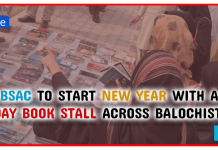Balochistan native Barket Ismail recognised the importance of an educated nation and established the Dynamic English Language Teaching Academy (Delta) in Turbat in 2001. By 2004, Delta had established six campuses in Turbat, and its alumni include bureaucrats, doctors, engineers, lecturers, magistrates and journalists.
Mr Ismail was awarded the 2017 Innovation Award by Pakistan’s South Asian Triple Helix Association, and is currently an assistant professor at the Government College Quetta. In 2008, he was named Best Teacher by the Kech district government. Mr Ismail was recently in Murree to attend a training organised by the Punjab Educational Endowment Fund. Dawn caught up with Mr Ismail in Islamabad to talk to him about Delta and the problems facing Balochistan’s education system.
Q: What inspired you to start Delta?
A: I was overwhelmed by sources of inspirations when I started Delta. The first and foremost was my own attachment to education, as I did my masters degree in Literature. The educational backwardness of Balochistan and lack of access to quality education for the poor pushed me to play a role in providing both. As a lecturer, I personally have seen incompetent teaching faculty in government schools and colleges, which also became a source of motivation for me. And last but not least, the meagre opportunities for girls was a driving force for making the dream of Delta a reality – a place where girls would get the same opportunities as boys.
Q: Who do you admire as an educationist?
A: Plato is my ideal. He is the educationist I admire the most. In the 20th Century, the United Nations declared that education is the universal right of everyone, but Plato said so in 400 BC. His education focused on four major areas – music, gymnastics, mathematics and dialectics. His curriculum was based on justice, courage, morals, values, character building, fitness and wisdom.
Plato believed that equal educational opportunities would allow society to live in peace and harmony. Without it, society [becomes unjust]. This is what is happening in Pakistan. No peace, no harmony. The result is that we remain backward.
Q: What do you think are the hindrances in Balochistan’s educational system, and how can they be overcome?
A: There are so many hindrances, but most important is the lack of political will to provide quality education to every child. There are obsolete and unproductive educational policies in the province. The textbook board in Balochistan does not have the capability to design and write books that cater to the cultural diversity of the province, and so it resorts to pasting together ideas and lessons taken from the textbooks of other provinces. And the politico-religious influence in Balochistan’s educational system has had devastating impacts.
Having four types of schools – public, middle-class private, elite private and seminaries – means inconsistency in teaching methodology and curriculum. And the appointment of teachers on a political basis rather than on merit results in incompetent teachers. If incompetent teachers are appointed, how can education become a source of change in society?
A multi-pronged strategy is needed to overcome the bottlenecks. Education should be a top priority in policies – not only in theory but also in practice. Education policymakers should be made independent from politicians, bureaucrats and religious influencers.
Implementation of the 18th Amendment in its true spirit and making education policies a provincial matter (regionalising the curriculum in accordance with the needs of the province, and modifying syllabuses and textbooks accordingly) is what is needed. There is lack of educationists; the services of competent educationists and researchers should be expanded. The educational system should be made one, eliminating the four types.
Q: Twelve Delta students recently qualified in the Balochistan Public Service Commission written exam. Since the BPSC has a bad reputation when it comes to advancement by merit, what do you suggest be done to ensure merit is adhered to?
A: Balochistan lags behind when it comes to having an efficient and effective bureaucracy. I suggest, especially to the BPSC, to maintain placement and advancement by merit and that those who qualify for assistant commissioner/section officer posts do not indulge in such activities where administration becomes a business (invest = profit).
There should be one panel for interviewing candidates. Those candidates who qualify for the posts should always bear in mind that the posts come with great responsibilities. They should therefore always perform their duties with integrity.
The Interview originally Published in DAWN










